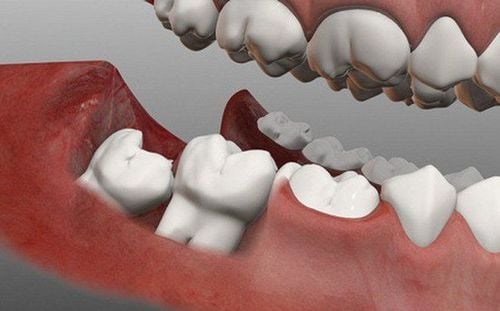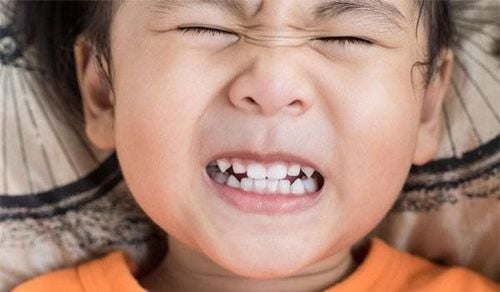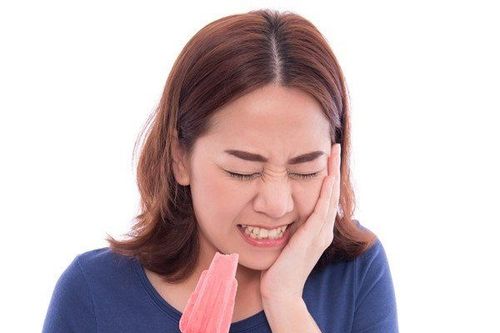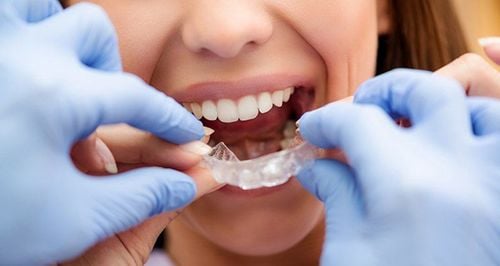This is an automatically translated article.
When you look at a sleeping child, you want to hear the sounds of sweet dreams: easy breathing and sometimes a sigh. But some parents who hear sounds other than breathing are hearing their baby's teeth grinding.
1. How is teeth grinding understood?
Teeth grinding in children is a medical term that refers to the act of clenching or clenching the teeth. Many children have it (two to three in 10 will grind or clench their teeth), but most develop it faster. Teeth grinding often occurs during deep sleep or when a child is under stress.
About 38% of children grind their teeth. The average age to start this habit is about 3 and a half years old and the average age to stop is 6 years old. However, people of all ages can experience teeth grinding.
Babies are also more likely to grind their teeth if they drool or talk while sleeping. Almost all teeth grinding occurs at night, although some children do it during the day as well.
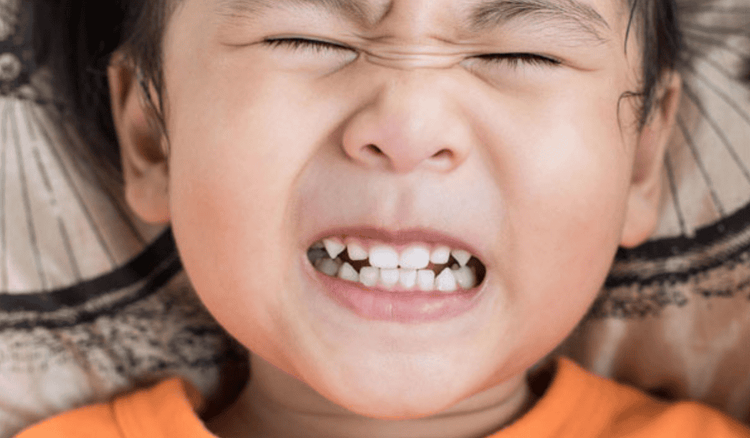
Nghiến răng có thể là biểu hiện bình thường hoặc của bệnh lý
2. What is the cause of teeth grinding?
Experts are not always sure why bruxism occurs. In some cases, children may grind their teeth because the upper and lower teeth are not aligned. Others do it as a response to pain, such as an earache or when teething. Children can grind their teeth as a way to ease pain, just as they can massage sore muscles.
Stress is often nervous tension or anger is another cause. For example, a child may be nervous about a test at school or a change in routine (new sibling or new teacher). Even arguing with parents and siblings can be so stressful that children grind their teeth or clench their jaws.
Some hyperactive children also have bruxism. And sometimes children with other medical conditions (such as cerebral palsy) or taking certain medications can experience bruxism.
3. Is teeth grinding harmful?
Many cases of bruxism go undetected with no ill effects, while others cause headaches or earaches. However, usually other family members will be more annoyed by the grinding noise caused.
In some cases, children grinding their teeth at night can wear away enamel, chip teeth, increase sensitivity to temperature, and cause severe pain and jaw problems, such as arthropathy. positive jaw. However, most kids who grind their teeth don't have this problem unless their grinding happens a lot.
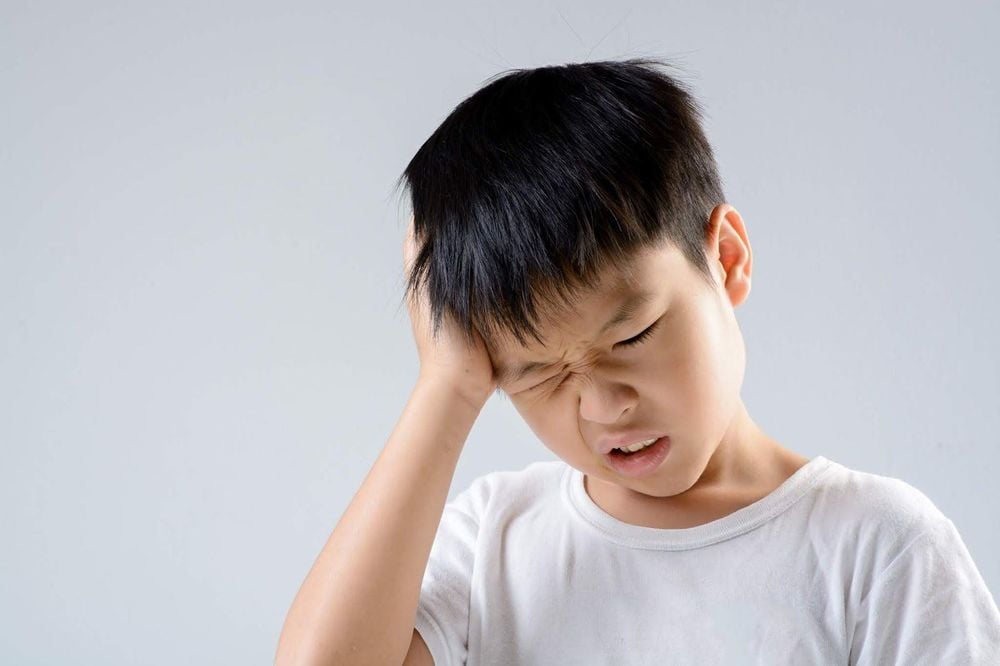
Nghiến răng kéo dài có thể gây đau tai ở trẻ
4. Signs of teeth grinding
Many kids who grind their teeth aren't even aware of it, so it's often a sibling or parent who identifies the problem.
Some signs to watch out for:
Noises while your child is sleeping Jaw pain after waking up in the morning Pain when chewing If you think your child is grinding their teeth, see your dentist, he or she will examine your teeth. to look for chipped enamel and unusual wear, and spray air and water on teeth to check for unusual sensitivity.
If lesions are found, the dentist may ask your child some questions, such as:
How do you feel before going to bed? Are you worried about anything at home or school? Are you mad at someone? What do you do before going to bed? A dental exam will help your dentist see if the cause is anatomical (misaligned teeth) or psychological (stress) and come up with an effective treatment plan.

Đau khi nhai có thể là dấu hiệu của tình trạng nghiến răng
5. Treatment of teeth grinding for children
Most children develop bruxism, but a combination of parental observation and dental visits can help manage the problem until they find it.
In cases where teeth grinding causes pain in the face and jaw or damage to the teeth, the dentist may prescribe a special night guard. Molded from children's teeth, the night guard is similar to an athlete's mouth guard. While it may take some people to get used to the shape of the mouth, positive results can be seen quickly.
6. Measures to help children reduce teeth grinding
Whatever the cause, physical or psychological, children can manage bruxism by relaxing before bedtime, e.g. by taking a warm bath or shower, listening to a few minutes of soothing music or read a book.
For stress bruxism, ask about what's bothering your child and get help. For example, a child who is worried about being away from home on their first camping trip may need reassurance that one parent will be nearby if needed.
If the matter is more complicated, such as moving to a new town, discuss your child's concerns and try to allay any fears. If you are concerned, talk to your doctor.
In rare cases, basic stress relievers are not enough to stop bruxism. If your child has trouble sleeping or acts differently than usual, the dentist or doctor can do further evaluation. This can help find the cause of the stress and an appropriate course of treatment.
Most children stop grinding their teeth when they lose their baby teeth. However, some children continue to enter adolescence. And if bruxism is caused by stress, it will continue until the stress subsides.

Ba mẹ có thể đưa trẻ đến khám tại Bệnh viện Đa khoa Quốc tế về răng hàm mặt
Because some bruxism is a child's natural response to growth and development, most cases cannot be prevented. However, stress-induced bruxism can be avoided. So talk to your kids about their feelings often and help them deal with stress. Taking your child for regular dental checkups can help find and treat bruxism.
When a child has abnormal signs of oral health, parents can take the child to the clinic for examination and treatment at the Odonto-Stomatology Department - Vinmec International General Hospital. Vinmec International General Hospital is a high-quality medical facility in Vietnam with a team of highly qualified medical professionals, well-trained, domestic and foreign, and experienced.
A system of modern and advanced medical equipment, possessing many of the best machines in the world, helping to detect many difficult and dangerous diseases in a short time, supporting the diagnosis and treatment of doctors the most effective. The hospital space is designed according to 5-star hotel standards, giving patients comfort, friendliness and peace of mind.
Please dial HOTLINE for more information or register for an appointment HERE. Download MyVinmec app to make appointments faster and to manage your bookings easily.
Reference: Kidshealth.org




